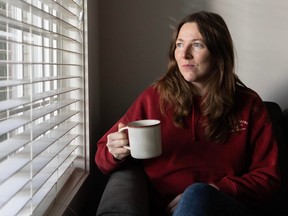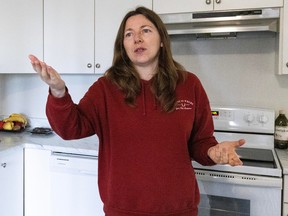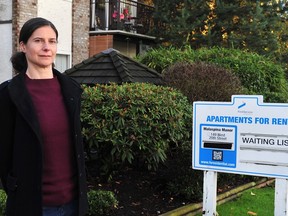A new trend in the housing crisis? As owners of homes and condos struggle to pay mortgages, some are renting out single rooms to strangers.

Article content
The woman who moved a few days ago into the empty room beside Anna Klochko’s bedroom was a total stranger until they met last week to introduce themselves.
“We had a conversation to know each other better. We checked our habits, our characters. We decided that we matched,” said Klochko, 39.
Article content
That initial meeting was a priority for both women, she added, because “it is important to know who you will live with.”
Advertisement 2
Article content
Klochko rents a single bedroom for $1,150 a month inside a New Westminster duplex owned by a family who live in a separate area of the house, and she shares common living spaces such as a bathroom and kitchen with the other renter.
When Klochko moved in on Nov. 1, there was another tenant renting the bedroom beside hers, whom she got to know. When that woman moved out earlier this month, the duplex owner found a new tenant.
It was this new tenant who Klochko met over coffee recently to ensure they could live together.
“I prefer a quiet environment,” she said. “So it was these kinds of things that are most important. For example, I’m not a partier and it would be inconvenient to have someone who really likes that.”
One challenge for the two women is that their job schedules are completely different: Klochko is a banquets waitress at a large downtown Vancouver hotel, where her shifts start very early in the morning or go very late at night, while the person who lives next to her works office hours.
“We will figure it out,” Klochko said. “We will just try to respect each other as much as possible.”
Advertisement 3
Article content
An optimistic person, she insisted she’s not apprehensive about learning to live with another stranger. “I’m not nervous because I’ve already met her and she looks nice.”

Unique living arrangements like Klochko’s are part of a growing trend in Canadian cities hit hardest by the housing crisis — where homeowners struggle to pay for mortgages and renters struggle to find affordable accommodations, say new figures from Rentals.ca, a website that posts rental listings.
“Listings for shared accommodations in B.C., Alberta, Ontario and Quebec increased 42 per cent from a year ago during October,” said the Rentals.ca November report.
This is happening, the organization said, as “renters look to save on costs by obtaining roommates and property owners try to mitigate soaring mortgage payments.”
Living with a roommate is, of course, not new. But this data suggests there is a new twist on that age-old practice, said David Aizikov, product manager of Data Services for Rentals.ca.
“It used to very much be people looking for a roommate. That has become less and less,” he said. “Now you’re seeing more and more of these shared accommodations with homeowners that are specifically looking to fill spare rooms.”
Article content
Advertisement 4
Article content
The biggest jumps in shared accommodations listings were in B.C. and Ontario, the provinces with the highest home prices.
B.C. had the highest average rent for a single-room rental in October of all provinces, at $1,176 a month, up about 20 per cent over the last year, the report says.
And Vancouver had the steepest average fees for these rentals compared to other Canadian cities, at $1,454 a month.
Although the number of shared accommodation listings is still relatively small compared to the other types of rental listings on the website, Aizikov argues this is evidence of a new trend in major Canadian cities — where there is a shortage of affordable rentals at the same time as high interest rates have driven up monthly mortgage payments for many homeowners.
“In the broader country, I think this is more so driven by the rising cost of living for property owners. And then in Vancouver, specifically, to an extent it’s also driven by changing legislation,” he said.
The B.C. government has new short-term rental legislation to dissuade homeowners from renting out rooms through services such as Airbnb, and instead offer them to long-term tenants.
Advertisement 5
Article content
The shared accommodation listings on Rentals.ca include spare bedrooms inside family homes, a phenomenon seen in suburbs such as Burnaby, Surrey, Coquitlam and Richmond.
“It looks to us, after a review of these listings, that these are homeowners that are looking for some ancillary income, they’re looking to cover the cost of their rising mortgages potentially,” Aizikov said.
“The property owner and their family potentially were living in the home and they were looking to rent out either one, two or, in some cases, even three spare bedrooms.”
In the downtown cores of major cities, this trend was seen inside condominiums.
“Vancouver saw a surge of listings within properties downtown — there were a lot of condominiums with a single room listed in a two- bed (unit),” he said.
Aizikov also found evidence of both rooms inside a two-bedroom Vancouver condo being listed individually for rent. “That was something that we hadn’t seen before,” he said.
A search of the Rentals.ca site shows a variety of shared accommodation listings:
• A room in a home near the Joyce SkyTrain where the two other bedrooms are occupied by the owners, for $1,020 a month. “You will get the 3rd room and share a washroom with one of the owners,” the listing says, adding the owners are “getting too many leads every day,” so only serious people should respond.
Advertisement 6
Article content
• A five-bedroom South Vancouver home listing a single bedroom for $800 a month. “Full bathroom shared with female. Washer/dryer and kitchen are also shared with family.”
• A bedroom in a Burnaby home for $1,050 a month. “Welcome to our family and be a part of it. We’re Asian family and looking forward to share our culture,” the listing says.
• A Burnaby homeowner wanting to rent a bedroom in her house for $1,155 a month. “My home has a kitchen, living room, dining room, bathroom, backyard, and balcony that you are welcome to use.”
• The owner of a Coquitlam home renting a spare bedroom for $1,260 a month. “Our shared space includes the kitchen, patio, dining room, and living room.”
So is this one innovative solution to the housing crisis?
Aizikov doesn’t think so, because it will appeal to a very limited number of renters.
“Sublets are really good for students, they’re good for young adults, young professionals who are just getting their start,” he said. “But it doesn’t work for families, couples, and those looking to grow their lives in a particular market.”
Renting out a room will work well for some people, but other tenants may be forced to follow this path because the market does not have nearly enough affordable rentals to meet demand, said Stuart Smith, director of Abundant Housing Vancouver.
Advertisement 7
Article content
“They’re acts of desperation because (tenants) don’t have better options,” said Smith, whose group pushes for more housing in the city.
Smith, who is a renter, would consider a shared accommodation if he was compelled to move, but not because it would be better than the private living arrangement he currently has.
“My choice would be either accept that or leave the region, leave my family, leave my friends, leave my work. And that’s something I don’t want to do.”
Governments at all levels are talking about increasing housing, but there has to be more urgency to get this done, Smith said.
Related Stories
Not having sufficient affordable housing inevitably leads to overcrowding, so an increase in shared accommodations in the region is not terribly surprising, said Andy Yan, director of SFU’s City Program and an adjunct professor of urban studies.
“It’s a method of densification, but not necessarily one that is planned,” he said.
Advertisement 8
Article content
Yan noted there has long been a tradition of Vancouver homeowners renting out portions of their properties to help pay the mortgage, whether it’s basement suites, providing rooms to students, or hiving off portions of large, older homes for tenants.
Smith, like Yan, noted there is a history, too, of rooms being rented to “boarders” in the city.
“I’m fairly certain people have been renting out rooms in houses for at least 100 years in Vancouver, probably longer. So I’m sure it’s ebbed and flowed, and maybe we’re having an uptick and that’s maybe worth looking at,” Smith said.

In a recent analysis by First United of 700 renters who had been evicted in B.C., 15 per cent said they lived “with roommates,” including a small number who said they lived with their landlord, said Sarah Marsden, director of social change and legal at the Downtown Eastside organization.
She cautioned that the Residential Tenancy Act, which outlines the rights of landlords and tenants in B.C., offers little assistance to some people in shared accommodations. “If you share a kitchen or bathroom with the landlord or owner, you have no protection from the RTA,” said Marsden, a lawyer.
Advertisement 9
Article content
For Klochko, though, the shared accommodations are working out just fine. She’s grateful to have an affordable place to live that’s near transit, shops and a park.
And the home’s owner, a kind woman Klochko met at work, can use the rent to help pay her mortgage.
Klochko is Ukrainian, and moved to Vancouver after the Russian invasion of her native country. She’s relieved just to have a safe housing situation.
“I’m happy to be here and not listen to the freaking missiles,” said Klochko, who worked as a journalist in Ukraine. “When I stay here, it is already safe. And I can enjoy it.”
Klochko hopes she and her new roommate will make a list together of things they need to buy for their shared space: a bathmat, a mop, and maybe a small coffee table.
She has advice for others considering shared accommodations: Be open about expectations and fix the small things — like a squeaky door — that could irritate each other.
“Don’t hesitate to tell the truth about your schedule. Be honest with each other about habits,” she said. “If there are some issues, not to keep it (quiet). To sit together and talk and solve the problem.”
Advertisement 10
Article content
She appreciates that the person living beside her bedroom is also female, and that she wanted to meet before moving in to make sure they could get along.
“It seems like we are interested in each other. So when our paths will cross in the kitchen, probably we’re going to feel pleasant and make small talk. I think that’s important for your roommate,” said Klochko, who has a very positive personality.
“I would love to rent on my own, you know, in some great location. But being realistic, for now I can afford to rent one room.”
— With files from Nathan Griffiths and Susan Lazaruk, Postmedia
Bookmark our website and support our journalism: Don’t miss the news you need to know — add VancouverSun.com and TheProvince.com to your bookmarks and sign up for our newsletters here.
You can also support our journalism by becoming a digital subscriber: For just $14 a month, you can get unlimited access to The Vancouver Sun, The Province, National Post and 13 other Canadian news sites. Support us by subscribing today: The Vancouver Sun | The Province.
Article content
Struggling with a high mortgage? More B.C. homeowners are now renting out single bedrooms - Vancouver Sun
Read More



Comments